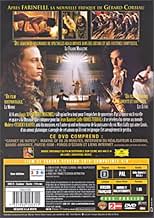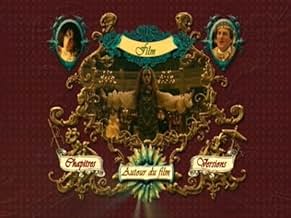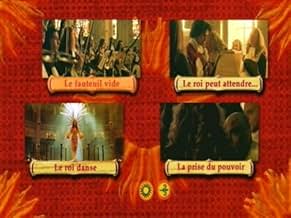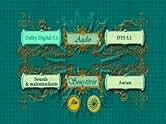Füge eine Handlung in deiner Sprache hinzuCorbiau repeats the Farinelli formula, artistic rivalry and social private drama expressed in dazzling, sometimes excessively lavish baroque scenery, music and costume, but this time in its ... Alles lesenCorbiau repeats the Farinelli formula, artistic rivalry and social private drama expressed in dazzling, sometimes excessively lavish baroque scenery, music and costume, but this time in its ultimate setting: Versailles. There are two protagonists - first the title character, Loui... Alles lesenCorbiau repeats the Farinelli formula, artistic rivalry and social private drama expressed in dazzling, sometimes excessively lavish baroque scenery, music and costume, but this time in its ultimate setting: Versailles. There are two protagonists - first the title character, Louis XIV, the French sun-king who has two passions, establishing absolute rule over the realm... Alles lesen
- Auszeichnungen
- 1 Gewinn & 5 Nominierungen insgesamt
- Prince de Conti
- (as Idwig Stephane)
Empfohlene Bewertungen
The same reviewer complained that the actors playing Molière, Conti and Cambert were much too old, that all three were closer to Louis' age. What bothered me more than the wrong ages of some of the supporting characters was the fabulous gorgeousness of the actors who played Louis and Lully. Please! There are good portraits of both men, and both of them were as homely as my aunt Gertrude - especially Louis.
That a man who looked like a gargoyle dwarf (he was only a few inches over five feet tall), saddled at the age of four with a bankrupt, strife-torn, second-rate country, transformed himself into the Sun King and his country into a major world power, and by the force of his will completely dominated Western civilization for nearly a century - and STILL, more than 300 years later, and despite the horrific revolution that destroyed the world he created, is the single most significant person in the history of France (only Napoleon comes close, and he was a flash in the pan compared to Louis) - is a big part of what makes him so extraordinary. If he had looked like Benoît Magimel, what would be the big deal? Gorgeous people automatically control the world; they don't have to DO anything. Louis is fascinating because he was NOT gorgeous, and making him gorgeous wipes out 75% of what makes him interesting.
The answer to both that reviewer's and my beefs with this movie is that its makers had no intention of making an historically accurate quasi-documentary about this fascinating man and the almost equally fascinating people around him. They intended to make an overblown, potboiler soap opera based loosely on real people. They made the principals gorgeous because who cares what happens to ugly people? They made the villains grotesque and old because if they had been young we might not have known they were the villains.
This is a French movie, but it might as well have been made in Hollywood. It is cheap (and I'm not talking about money) melodrama, with gorgeous, dashing heroes and old, ugly, hunched-over, troll-like villains with grotesque birthmarks on their faces. It was NOT made for experts in French history or any other persons of intelligence and discernment.
It was made for an audience that neither knows nor cares how accurate it is or who the people in it are. That's how Hollywood does everything, by formula - the same formula they used in silent westerns, where you knew the good from the bad guys by the color of their hats - so audiences don't have to think, don't have to understand anything. They know by their looks which characters to cheer and which ones to boo, and that's all that matters.
Although a lot of famous historic characters appear (Colbert,Louvois,La Vallière,Maintenon),only five emerge :the threesome KIng/Lulli/Molière and ,at the beginning, two silhouettes ,the Queen mother,Anne d'Autriche ,and the king's cousin,Conti.
The king,played with talent by Benoit Magimel,who shows himself a first-class dancer ,is not exactly the king we find in history books:okay,he rules alone,but a lot of time is given over to arts ..in the first part of his reign,the king was first a soldier :the fine arts connoisseur came only second.(music,dance,gardens...).
Lulli (or Lully depending on whom you ask)was an Italian,so it's very surprising -and it's the main flaw of the whole film- he speaks without the slightest accent.Of course,and probably because c'est à la mode,the director doesn't pass over Lully's homosexuality but he does not lay great stress on it,preferring to give music more than its due:Lully's was majestic and magnificent,the KIng Music par excellence.
Tcheky Kario shines as Molière and gives what will probably be his lifetime role.A jaded and coughing actor/playwright/director whose genius was still brilliant,he had to cope with sanctimonious persons (les dévôts de la compagnie du Saint-Sacrement)and leter with Lully's jealousy.
The last Lully -Molière collaboration,"le bourgeois gentilhomme" (arguably Molière's funniest work),made Molière a visionary who was beginning to see theater as a complete show .The Turkish ceremony " in "le bourgeois gentilhomme" and its celebrated menuet (sadly not included in the film) were forerunners of the musicals.But Lully,who played the "Mufti" in the play ,felt like a buffoon and feared that the king might favor Molière over him.
Lully wanted to be a king and" a king ain't satisfied till he owns everything "as Bruce Springsteen sings ,so the dancer became a wolf .Molière was not his one victim :he actually put down all his rivals and had a complete stranglehold on the king's music.
Some users complain about Courbiau's baroque style:since at least one third of the time is dedicated to arts ,what's the point of being realist and austere ?We're not dealing with Rossellini directing "la prise du pouvoir par LOuis XIV",dash it! Okay ,some sequences are ponderous -Molière's death on stage while playing "le malade imaginaire" did not need this dancers dressed up as skeletons,for instance.But if cinema means change of scenery,"le roi danse" pulls it off with gusto.
Wusstest du schon
- WissenswertesThe small violin Lully plays when conducting the orchestra is called a 'pochette', so called because it could be carried in a coat pocket.
- VerbindungenFeatured in Abenteuer Arte: D'Artagnan, Musketier im Dienst des Sonnenkönigs (2021)
- SoundtracksTe Deums: Symphonie
Written by Jean-Baptiste Lully
Conducted by Reinhard Goebel
Performed by Musica Antiqua Köln
Top-Auswahl
- How long is The King Is Dancing?Powered by Alexa
Details
- Erscheinungsdatum
- Herkunftsländer
- Offizielle Standorte
- Sprache
- Auch bekannt als
- The King Is Dancing
- Drehorte
- Produktionsfirmen
- Weitere beteiligte Unternehmen bei IMDbPro anzeigen
Box Office
- Budget
- 21.000.000 $ (geschätzt)
- Weltweiter Bruttoertrag
- 3.203 $
- Laufzeit1 Stunde 55 Minuten
- Farbe
- Sound-Mix
- Seitenverhältnis
- 2.35 : 1
Zu dieser Seite beitragen




























